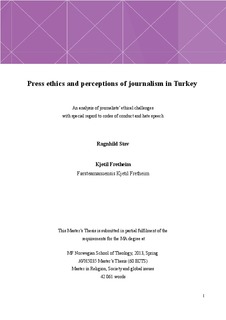| dc.description.abstract | This master thesis analyzes the ethical challenges journalists have in their work, with special regard
to code of conduct and hate speech. When it comes to the issue of hate speech, this master thesis
focuses at hate speech directed to minorities in Turkey.
The media market in Turkey is highly regulated by laws and regulations. As a result of that several
newspapers have been in trouble with the law. This in turn leads to self-censorship in the business.
Two media groups own 80 percent of the newspapers. This makes the media very concentrated.
Media owners also invest in other businesses, such as energy, automotive, telecommunication.
Since media owners also invest in other companies, journalists avoid writing critical about
companies the owner of their newspaper has made investments in. Hate speech directed in
newspapers at minorities, are not problematized among the public. After Turkey was founded as a
republic, there was a homogenization policy in Turkey. Minorities didn't have the same rights in
Turkey as Turks. Foreign countries such as France, Britain and Russia, forced Turkey to grant
minority rights. This has caused a bad memory in Turkey, when talking about minority rights.
Minorities are often written about as terrorists, like the Kurdish people. Hate speech can lead to hate
crime, and there is no legislation of either hate speech or hate crime.
In order to have some reflections about the issues journalists have in their work with special regard
to code of conduct and hate speech, I conducted 10 interviews with people who has worked and
works as journalists, columnists and in organizations which have competence in this field.
The study shows that it's difficult writing ethical about issues such as corruption, non-unionization,
Kurdish/Armenian issue, because the media owners invest in other sectors as well. The media is
regulated with many laws, and these laws can be used against newspapers when they write about
something which is in disfavor of the government. The media has a clientalist relationship with the
government, which also makes it difficult writing critical news about the government. Since
nationalism is deep-rooted in the society in Turkey, hate speech targeted at minorities don't cause
reactions at the people. The only type of hate speech that has been problematized by the
government is Islamophobia. What would normally been regarded as freedom of speech, has been
violated in Turkey, blaming it for insulting Turkishness. | no_NO |
